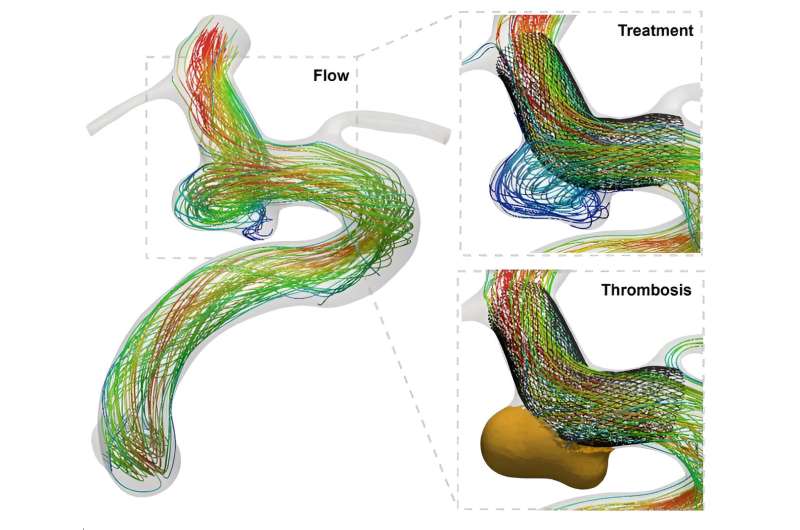This article has been reviewed according to Science X's editorial process and policies. Editors have highlighted the following attributes while ensuring the content's credibility:
fact-checked
peer-reviewed publication
trusted source
proofread
Research progress reveals faster, more accurate blood flow simulation to advance treatment of vascular diseases

A review has shed light on the advancements in the simulation of blood flow within the intricate vascular system that could transform medical treatment and device innovation for vascular diseases.
Modeling vascular flow is crucial for understanding and treating vascular diseases, but traditional methods are labor and computationally intensive. The new research, published in the Journal of the Royal Society Interface, evaluates state-of-the-art methods that accelerate the simulation process while retaining the level of accuracy required for such crucial applications.
The researchers, led by The University of Manchester, found that reduced order modeling (ROM)—a technique for reducing the computational complexity—can be used selectively to accurately accelerate various types of vascular flow modeling problems.
They also found that machine learning methods can be used to overcome limitations in ROM techniques or to provide entirely new simulation techniques that can tackle a wide array of vascular flow modeling problems.
The findings have the capacity to revolutionize the vascular medical field.
Professor Alex Frangi, Bicentennial Turing Chair in Computational Medicine, said, "The potential ramifications are immense—from the development of enhanced medical devices that can be custom-fitted to individual patient anatomy, to providing real-time insights during surgical procedures, advancements in these techniques could improve patient outcomes and the standard of care."
The review also highlights the significance of these accelerated simulation methods for in-silico trials, which are virtual simulations integral to the development and regulatory approval of new medical devices. Using these simulation acceleration techniques, in-silico trials can be conducted with unprecedented speed and accuracy, reducing reliance on conventional clinical trials that are often expensive and time consuming.
The research also advocates for a concerted effort to establish a benchmarking framework for simulation acceleration methods. This initiative would establish standardized metrics for evaluating precision and speed-up across different simulation approaches, encouraging transparency and comparability in this rapidly advancing field.
Michael Macraild, a Ph.D. candidate at the University of Leeds, who is supervised by Prof Frangi and other co-authors of the study, added, "As we stand on the cusp of a new epoch in medical technology, this study signals a future where bespoke patient care is delivered more swiftly and effectively than ever before. The full implications of this research are only just beginning to unfurl, promising a healthier future for all."
More information: Michael MacRaild et al, Accelerated simulation methodologies for computational vascular flow modelling, Journal of The Royal Society Interface (2024). DOI: 10.1098/rsif.2023.0565



















